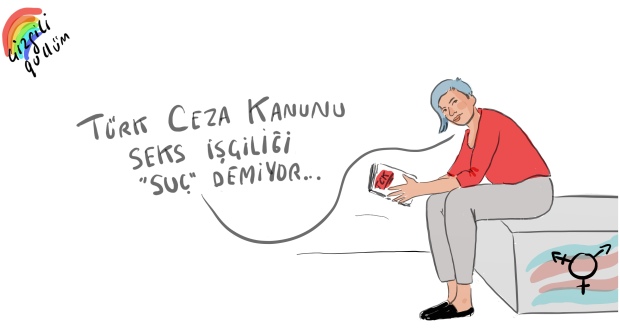On the occasion of the 3rd of March International Sex Workers’ Rights Day, for the KaosGL readers, we have compiled the details of how the right to work, which is one of the fundamental rights of trans sex workers, is being violated and how this violation can be combated.
Source: “How is the trans sex workers’ right to work being violated in Turkey?” (Türkiye’de trans seks işçilerinin çalışma hakkı nasıl ihlal ediliyor?), Aslı Alpar, Kaos GL, 3rd of March, 2020 https://www.kaosgl.org/haber/turkiye-de-trans-seks-iscilerinin-calisma-hakki-nasil-ihlal-ediliyor
According to the Constitution’s relevant article on the right to work, “work” is defined as “the right and duty of everyone”.
The same article includes the following statement: “the state takes the necessary measures to increase the quality of the employees’ lives, to protect the employees and the unemployed in order to improve working life, to support the work, to create an economic environment suitable for preventing unemployment, and to ensure peace of work.”
However, when it comes to sex workers, the right to work, which is one of the fundamental rights in the Constitution, is violated. Trans sex workers are exposed to discrimination based on gender identity as well as violations of the right to work.
So, by what means do the laws, those who work for the implementation of the laws, and the law enforcement forces violate trans sex workers’ right to work?
1 – The Law of Misdemeanours
The law of misdemeanours is a law defining various misdemeanours “in order to protect the social order, public morality, public health, environment and economic order.”
In this law, there is no article that defines the work of sex workers as misdemeanours. However, by using this law, law enforcement officers frequently impose administrative fines on sex workers who find customers on the street.
It is possible to fight against the fines imposed by the articles 32, 36 and 37 of the Law through the Criminal Court of Peace. You can use this link to reach an example of the petition that should be written against administrative fines, which was prepared by the Pembe Hayat LGBTI + Solidarity Association.
2 – The Law of Highway Traffic
Another tool used to violate sex workers’ right to work is the Law of Highway Traffic and the Highway Traffic Regulations enacted in relation to this law. Administrative fines are imposed on sex workers by using the first paragraph of the Article 68 of the Law, which regulates the rules for pedestrians.
The relevant article states, “The pedestrians who are on pedestrian roads, crossings or highways when necessary, are prohibited from acting in a way that will prevent or endanger the traffic.”
Sex work is not prohibited in the Turkish Criminal Law. In order to arbitrarily prevent sex workers from their works, the Law of Misdemeanours and the Law of Highway Traffic are being used to punish sex workers, although these laws do not contain the relevant provisions.
3 – Fines to the business cards
Business cards used by sex workers were sent to court under the article 226 of the Turkish Criminal Law, which regulates “obscenity”. After removing their photos, which had been seen as obscene images, from the cards, the sex workers faced another problem after the state of emergency.
The article 227 of the Turkish Criminal Law, which is one of the bag bills enacted during the state of emergency, was amended under the Law on the Amendment of Some Laws and the Criminal Procedure Law No. 6763 published in the official newspaper on December 2. According to this article, “prostitution” is not taken as a crime, but it is forbidden to advertise “prostitution”.
4 – Tracking on social media
Another practice that usurps the sex workers’ right to work is tracking on social media and law enforcement forces raiding houses. By hiding their identities and acting like a client, these officers make contact with the sex workers who use social media to communicate with the clients after the ban on business cards. Then, they go to the sex workers’ houses and impose fines.
5 – Red tagging the houses, closing the streets
Another violation tool of the administration is to seal the houses with red tags and to close the streets.
Bornova Street in İzmir, where trans sex workers often work, for a while was closed every night the law enforcement forces and the trans people’s right to work was violated. Trans sex workers, whose rights and freedoms are restricted unlawfully in the closed street, are deprived of the procedural security granted to persons in case of detention, and the “medical examination” that must be carried out in custody is skipped.
Red tagging the houses where the trans sex workers work and live leads to another violation of the rights. In addition to being left homeless, the sex workers whose work and housing rights are being violated as a result of the red tags at their houses are not able to work until the tags are lifted.
Illustration: Aslı Alpar The person on the illustration says “Turkish Penal Code does not consider sex work to be a crime”.
